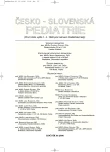Heiner Syndrome (Pulmonary Hemosiderosis Induced by Allergy to Cow’s Milk Proteins)
Heinerov syndróm (Pľúcna hemosideróza indukovaná alergiou na bielkoviny kravského mlieka)
Primárna pľúcna hemosideróza (PPH) je zriedkavé, ale potenciálne letálne ochorenie. Existujú viaceré teórie vysvetľujúce jej vznik (genetická, autoimunitná, alergická, environmentálna, metabolická), ale presný mechanizmus nie je stále známy. PPH je charakterizovaná opakovanými epizódami intraalveolárneho krvácania s následnou abnormálnou akumuláciou železa vo forme hemosiderínu v pľúcnych makrofágoch, zhrubnutím alveolárnych bazálnych membrán a intersticiálnou fibrózou. Jedným z podtypov PPH je Heinerov syndróm (HS), prvýkrát popísaný približne pred 40 rokmi. Ide o pľúcne ochorenie spôsobené alergiou na bielkoviny kravského mlieka (BKM). Okrem klasickej triády príznakov PPH (hemoptýza, sideropenická anémia, difúzne pľúcne infiltráty na RTG snímke) je pre HS typický nález vysokých titrov precipitínov proti BKM a zlepšenie klinického stavu po vylúčení kravského mlieka zo stravy. Na rozdiel od ostatných typov PPH má HS lepšiu prognózu a obyčajne nevyžaduje dlhodobú imunosupresívnu ani kortikoidnú terapiu. Aj napriek tomu, že je toto ochorenie pomerne zriedkavé, malo by sa naň myslieť v rámci diferenciálnej diagnostiky chronických pľúcnych ochorení nejasnej etiológie u detí s evidentnými príznakmi potravinovej alergie.
Kľúčové slová:
pľúcna hemosideróza, alergia na bielkoviny kravského mlieka, respiračné symptómy, precipitíny, eliminačná diéta, dieťa
Authors:
M. Jeseňák
; Peter Bánovčin
; J. Buchanec
Authors‘ workplace:
Klinika detí a dorastu JLF UK, Martinská fakultná nemocnica, Martin
prednosta prof. MUDr. P. Bánovčin, CSc.
Published in:
Čes-slov Pediat 2006; 61 (4): 207-212.
Category:
Postgraduate Education
Overview
Primary pulmonary hemosiderosis (PPH) is a rare, but potentially lethal disease. There are various theories explaining the origin (genetic, autoimmune, allergic, environmental, metabolic), but precise mechanism is still unknown. PPH is characterized by repeated episodes of inrtraalveolar bleeding with subsequent abnormal accumulation of iron in the form of hemosiderin in lung macrophages, roughening of alveolar basal membranes and interstitial fibrosis. One of the subtypes of PPH is the Heiner syndrome (HS), described for the first time 40 years ago. It is a lung disease caused by allergy to the proteins of cow’s milk (CMP). In addition to the classical triad of PPH symptoms (hemoptisis, sideropenic anemia, diffusion lung infiltrates on X-ray picture), there is a typical finding of high titres of precipitins against CMP and improvement of clinical condition after exclusion of cow’s milk from the diet. In contrast to other types of PPH, there is better prognosis for HS, and long-term immunosuppressive or corticoid therapy is usually not necessary. Although the disease is relatively rare, it should be kept in mind in differential diagnosis of chronic pulmonary diseases of uncertain etiology in children with obvious symptoms of dietary allergy.
Key words:
pulmonary hemosiderosis, cow’s milk allergy, respiratory signs, precipitins, milk elimination, child
Labels
Neonatology Paediatrics General practitioner for children and adolescentsArticle was published in
Czech-Slovak Pediatrics

2006 Issue 4
- What Effect Can Be Expected from Limosilactobacillus reuteri in Mucositis and Peri-Implantitis?
- The Importance of Limosilactobacillus reuteri in Administration to Diabetics with Gingivitis
-
All articles in this issue
- Low-dose Technique of Spiral CT of the Lungs in the Diagnostics of Metastatic Focal Findings in Children and Adolescents
- TNF G-308A Polymorphism in Children with Nephrotic Syndrome
- Methylmalonic Acidemia: Clinical, Biochemical and Molecular Biological Study
- Progressive Familial Intrahepatic Cholestasis – Manifestations and Diagnosis in Infancy
- Heiner Syndrome (Pulmonary Hemosiderosis Induced by Allergy to Cow’s Milk Proteins)
- Immune System in Patients with Cystic Fibrosis. Is Everything Normal?
- Czech-Slovak Pediatrics
- Journal archive
- Current issue
- About the journal
Most read in this issue
- Methylmalonic Acidemia: Clinical, Biochemical and Molecular Biological Study
- Heiner Syndrome (Pulmonary Hemosiderosis Induced by Allergy to Cow’s Milk Proteins)
- Low-dose Technique of Spiral CT of the Lungs in the Diagnostics of Metastatic Focal Findings in Children and Adolescents
- Progressive Familial Intrahepatic Cholestasis – Manifestations and Diagnosis in Infancy
